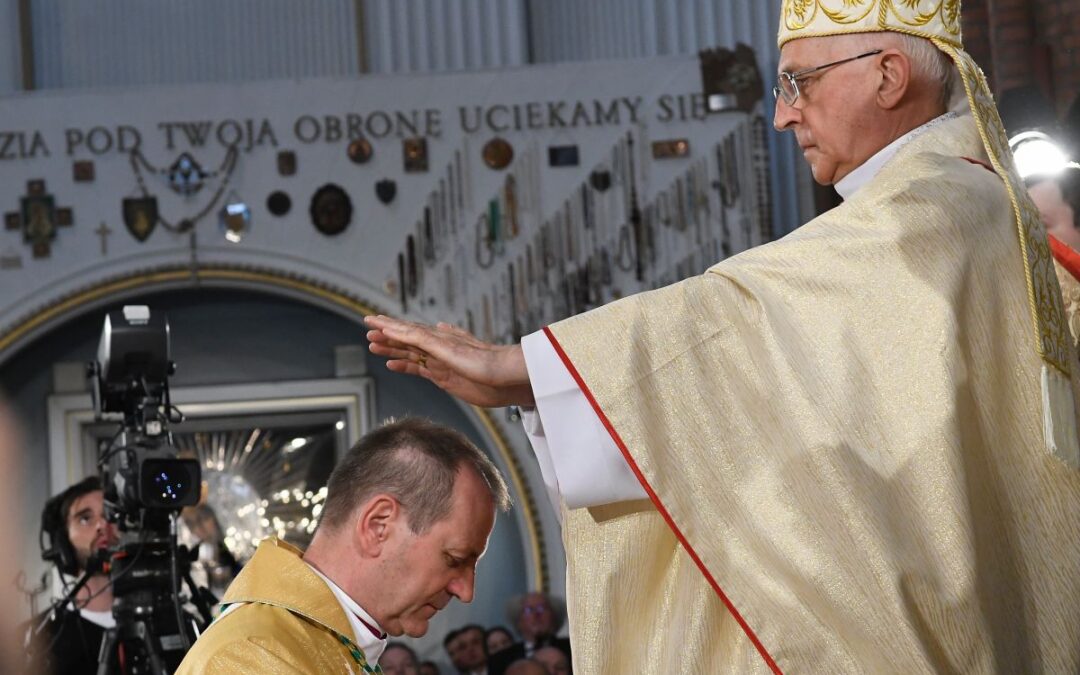Poland’s Catholic episcopate has chosen Tadeusz Wojda, the archbishop of Gdańsk, as its new head. He replaces the outgoing Stanisław Gądecki, who is standing down after ten years as president of the Polish Episcopal Conference (KEP), the central organ of the Catholic church in Poland.
Wojda will take over an institution widely seen to be in crisis following revelations of negligence in dealing with child sex abuse and accusations of political interference, especially regarding an unpopular near-total ban on abortion that was introduced in 2021.
Though over 90% of Poland’s population officially remain members of the Catholic church, recent years have seen significant declines in church attendance and the proportion of Poles who identify as Catholic.
Wojda’s election has been welcomed by a number of voices within the church. However, a leading Catholic commentator has called him “one of the worst possible choices” and argued that Wojda has himself shown negligence in dealing with sex abuse in the church.
Były przewodniczący KEP @Abp_Gadecki pogratulował abp. Tadeuszowi Wojdzie SAC wyboru na nowego przewodniczącego Konferencji Episkopatu Polski. #397ZPKEP pic.twitter.com/jdoNK2MVtw
— EpiskopatNews (@EpiskopatNews) March 14, 2024
On Friday morning, the KEP announced that the 67-year-old Wojda had been chosen as its new president in a secret vote by Poland’s 94 diocesan and auxiliary bishops. He will serve a five-year term in office with Józef Kupny, the archbishop of Wrocław, elected as his deputy.
They replace Gądecki and his deputy, Marek Jędraszewski, who had both served two five-year terms, the maximum permitted. During their decade in office, the pair were seen to have moved the church more closely in line with the conservative Law and Justice (PiS) party that ruled Poland from 2015 to 2023.
Wojda became archbishop of Gdańsk in 2021, replacing Sławoj Leszek Głódź, who had left amid accusations of failing to take action against priests accused of sex abuse, as well as of bullying subordinates and living a lavish lifestyle at the church’s expense. Głódź was disciplined by the Vatican in 2021.
At the time of writing, Wojda had not yet commented on his election nor his plans for his tenure.
The Vatican has punished two Polish bishops over their "negligence" in responding to cases of sexual abuse against minors by members the Catholic clergy https://t.co/XVOqCqSGwr
— Notes from Poland 🇵🇱 (@notesfrompoland) March 29, 2021
The selection of Wojda was criticised by a prominent Catholic commentator and journalist, Tomasz Terlikowski, who has been highly critical of the church hierarchy in recent years, especially over its response to revelations of child sex abuse by clergy.
He told news website Wirtualna Polska that Wojda was “one of the worst possible choices”. He is “a classic hierarch without any qualities, a compromise candidate who is supposed to please everyone and does not present a clear line,” added Terlikowski, speaking to broadcaster RMF.
The journalist also said that his sources tell him that Wojda “does not handle sex abuse cases properly” and indeed that Gdańsk “is one of the most problematic dioceses in this matter”.
“An archbishop who helps perpetrators, not victims, has become the new chairman of the KEP,” tweeted Terlikowski, saying that the decision shows “what the episcopate thinks about victims and the protection of minors”.
Wszyscy, którzy walczyli o tę sprawę zostali wycięci. I to by było na tyle w kwestii tego, co Episkopat sądzi o ofiarach, skrzywdzonych, o ochronie małoletnich. Ładnie się chłopaki bawią. 2/2
— Tomasz Terlikowski (@tterlikowski) March 14, 2024
Szymon Piegza, a journalist at news website Onet whose work has focused on the church, like Terlikowski believes that Wojda is a compromise candidate who will continue Gądecki’s approach of trying to balance the different factions within the Polish church.
Piotr Sikora, writing for liberal Catholic weekly Tygodnik Powszechny, wrote that the selection of a low-profile figure like Wojda “will probably result in further marginalisation of the importance of the episcopate”.
Many commentators have also noted that Wojda has been outspoken in his anti-LGBT rhetoric. In 2020, while archbishop of Białystok, he expressed opposition to the city’s first ever pride march, saying that Poland “reeks of the sin of homosexuality”.
He encouraged people to sign petitions calling for the march to be banned. It eventually went ahead, but was violently attacked by nationalist protesters. Wojda condemned those attacks.
Violent scenes at Białystok's first ever LGBT march. A few hundred participants were protected by a similar number of police from protesters throwing fireworks, attempting to grab rainbow flags and chanting 'Białystok free from sodomy'. A few were detained https://t.co/yABtZT7AXt
— Notes from Poland 🇵🇱 (@notesfrompoland) July 20, 2019
Voices within the church today welcomed Wojda’s appointment. Henryk Zieliński, a priest and editor of Catholic weekly Idziemy, said he was “very happy” with the choice and that Wojda has a “vision that the church in Poland needs right now”.
He is a man who can “meet the challenges of modern times” by combining “a conservative attitude when it comes to…remaining faithful to the Gospel” but with “dynamism in preaching this Gospel”, Zieliński told news website wPolityce.
Mirosław Kalinowski, a priest and rector of the Catholic University of Lublin (KUL), also welcomed Wojda’s appointment but warned that he faces “enormous challenges” that “require decisive strategic action, far-sightedness, but also prudence, responsibility and fidelity to the Gospel”.
TYLKO U NAS. Ks. Zieliński o nowym szefie @EpiskopatNews: Wizja abp. Wojdy jest obecnie Kościołowi w Polsce potrzebna. Podchodzę do jego wyboru z pełną nadzieją https://t.co/oUCCG26mzn
— wPolityce.pl (@wPolityce_pl) March 14, 2024

Notes from Poland is run by a small editorial team and published by an independent, non-profit foundation that is funded through donations from our readers. We cannot do what we do without your support.
Main image credit: Janusz Blank / Archidiecezja Białostocka (under CC BY-NC-SA 2.0)

Daniel Tilles is editor-in-chief of Notes from Poland. He has written on Polish affairs for a wide range of publications, including Foreign Policy, POLITICO Europe, EUobserver and Dziennik Gazeta Prawna.



















